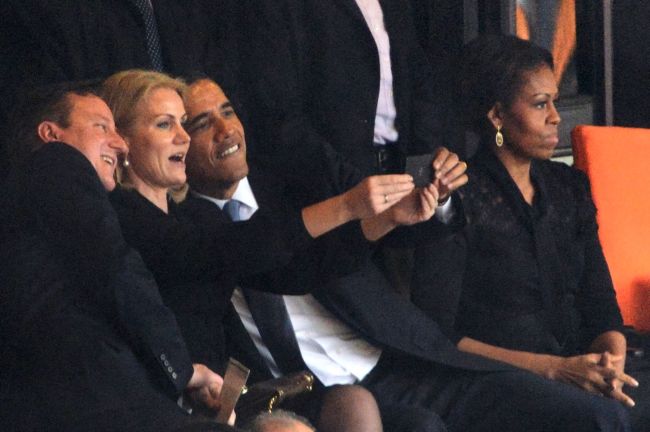PARIS (AFP) ― E-cigarettes replaced nicotine patches, grunge returned to the catwalk, Daft Punk swept dance floors and “selfie” made it into the dictionary.
Here are some of the lifestyle trends of 2013:
― The scene at Nelson Mandela’s memorial service served as confirmation ― if any were needed ― of the selfie’s newfound place in the English language.
Here are some of the lifestyle trends of 2013:
― The scene at Nelson Mandela’s memorial service served as confirmation ― if any were needed ― of the selfie’s newfound place in the English language.

As the ceremony for the anti-apartheid hero who died earlier in December dragged on, U.S. President Barack Obama, British Prime Minister David Cameron and Danish Prime Minister Helle Thorning-Schmidt were captured posing for a self portrait like a group of excited teenagers.
Another of the year’s most memorable selfies was by Italian astronaut Luca Parmitano, who photographed himself in space outside the International Space Station capturing the Earth’s reflection in his visor.
Originally a social media buzzword, “selfie” was named word of the year in November and admitted to the online version of the Oxford English dictionary.
It is defined as “a photograph that one has taken of oneself, typically one taken with a smartphone or webcam and uploaded to a social media website.”
Its evolution into the mainstream combined with a “phenomenal upward trend” in its use warranted its inclusion in the dictionary, Oxford Dictionaries said.
― Touted as “the real thing minus the tar, ash, smoke and most toxins,” e-cigarettes took off as an alternative to tobacco.
The battery-powered devices come with tips that light up and glow with the aid of an LED.
Smoke appears to waft from them but it is in fact water vapor.
Singer Robbie Williams and Twilight actor Robert Pattinson are among the famous names reported to have tried them out.
Like traditional cigarettes, they deliver nicotine but experts say there are only trace amounts of the other toxic chemicals to which smokers are habitually exposed.
The jury is still out on whether they involve other yet-to-emerge hazards to health. But their popularity is not in doubt.
Sales have doubled in the United States each year since 2008 and were predicted to reach $1 billion in 2013.
― On the catwalk, Saint Laurent’s cult designer Hedi Slimane served up helpings of grunge, prompting a mixture of consternation and rave reviews.
Dismissed as nothing new by some critics, his creations, however, have a habit of taking off.
The designer, who helped give the world skinny jeans and was at the helm of Christian Dior menswear until 2007, is considered among the most influential of his generation.
His babydoll dresses teamed with sloppy cardigans, biker boots and heavy khol-lined eyes divided fashion watchers, many of whom feel Slimane’s designs are “just not Yves Saint Laurent.”
Betty Catroux, a muse of the late designer and founder of the fashion house, however, jumped to his defense.
“He has completely understood the spirit of Saint Laurent,” she said after what she conceded was a “very young” womenswear collection in March.
Others were not so sure, with industry journal Women’s Wear Daily calling the collection “interesting to the point of odd.”
― “Twerking,” another new entry into the Oxford Dictionary online, exploded into the mainstream when former Disney child star Miley Cyrus did the dance at the MTV video music awards in August.
Cyrus’ sexually suggestive performance at an event with a family audience outraged middle America.
Restricted to teenagers and performers for now, it was defined by Oxford Dictionaries as to “dance to popular music in a sexually provocative manner involving thrusting hip movements and a low, squatting stance.”
It is believed to have originated in U.S. hip-hop music culture via the New Orleans bounce music scene.
― In music, French electronic duo Daft Punk, made up of musicians Guy-Manuel de Homem-Christo and Thomas Bangalter, made a triumphant return to the music charts.
“Random Access Memories,” the duo’s fourth album since 1997 entered the U.S. Billboard 200 album chart at number one in May.
The first single from the album, “Get Lucky,” co-written by Chic’s Nile Rodgers and featuring vocals from U.S. rapper Pharrell Williams, was a top 10 hit in over 30 countries.
Daft Punk fever even made it to the remote Australian town of Wee Waa, population 1,653, which was chosen for the album launch.
Thousands of people, many in the duo’s trademark robot helmets, descended on the far-flung town where the local butcher shop entered into the spirit of the event by crafting Daft Pork sausages and Random Access rissoles.
“Electronic music right now is in its comfort zone and it’s not moving one inch,” Bangalter told Rolling Stone magazine.
― The moreish, absorbing Candy Crush Saga became an online gaming sensation with its brightly colored exploding sweets.
Players attempt to line up three or more sweets such as yellow lemon drops, orange lozenges and red jelly beans in order to progress to higher levels.
Each day, with some 700 million games of Candy Crush played, the game has been racking up sales of $850,000.
As online games grew in popularity, offline games were expected to record an irreversible decline in 2013.
― Asian social networks emerged as rivals to American giants Facebook and Skype.
China’s WeChat and Korea’s Line, which let users make free calls, send instant messages, photos and short videos, roll together attributes from Facebook, Skype and messaging application WhatsApp.
Line, which has 230 million users, including 47 million in Japan and 15 million already in Spain, signaled its determination to conquer Europe with a public relations offensive in France and Italy.
Line has hooked many users with its “stickers” ― funny, cartoon-like figures that express emotions in a way deemed far more original and fun than traditional emoticons.
WeChat, meanwhile, allows users to post figures that move about dancing, blowing kisses or punching the air.
Both networks supply a selection of “stickers” that users have to pay for, representing 30 percent of Line’s overall turnover.
WeChat has already been translated into 19 languages and has 500 million users, including 100 million outside China.
Another of the year’s most memorable selfies was by Italian astronaut Luca Parmitano, who photographed himself in space outside the International Space Station capturing the Earth’s reflection in his visor.
Originally a social media buzzword, “selfie” was named word of the year in November and admitted to the online version of the Oxford English dictionary.
It is defined as “a photograph that one has taken of oneself, typically one taken with a smartphone or webcam and uploaded to a social media website.”
Its evolution into the mainstream combined with a “phenomenal upward trend” in its use warranted its inclusion in the dictionary, Oxford Dictionaries said.
― Touted as “the real thing minus the tar, ash, smoke and most toxins,” e-cigarettes took off as an alternative to tobacco.
The battery-powered devices come with tips that light up and glow with the aid of an LED.
Smoke appears to waft from them but it is in fact water vapor.
Singer Robbie Williams and Twilight actor Robert Pattinson are among the famous names reported to have tried them out.
Like traditional cigarettes, they deliver nicotine but experts say there are only trace amounts of the other toxic chemicals to which smokers are habitually exposed.
The jury is still out on whether they involve other yet-to-emerge hazards to health. But their popularity is not in doubt.
Sales have doubled in the United States each year since 2008 and were predicted to reach $1 billion in 2013.
― On the catwalk, Saint Laurent’s cult designer Hedi Slimane served up helpings of grunge, prompting a mixture of consternation and rave reviews.
Dismissed as nothing new by some critics, his creations, however, have a habit of taking off.
The designer, who helped give the world skinny jeans and was at the helm of Christian Dior menswear until 2007, is considered among the most influential of his generation.
His babydoll dresses teamed with sloppy cardigans, biker boots and heavy khol-lined eyes divided fashion watchers, many of whom feel Slimane’s designs are “just not Yves Saint Laurent.”
Betty Catroux, a muse of the late designer and founder of the fashion house, however, jumped to his defense.
“He has completely understood the spirit of Saint Laurent,” she said after what she conceded was a “very young” womenswear collection in March.
Others were not so sure, with industry journal Women’s Wear Daily calling the collection “interesting to the point of odd.”
― “Twerking,” another new entry into the Oxford Dictionary online, exploded into the mainstream when former Disney child star Miley Cyrus did the dance at the MTV video music awards in August.
Cyrus’ sexually suggestive performance at an event with a family audience outraged middle America.
Restricted to teenagers and performers for now, it was defined by Oxford Dictionaries as to “dance to popular music in a sexually provocative manner involving thrusting hip movements and a low, squatting stance.”
It is believed to have originated in U.S. hip-hop music culture via the New Orleans bounce music scene.
― In music, French electronic duo Daft Punk, made up of musicians Guy-Manuel de Homem-Christo and Thomas Bangalter, made a triumphant return to the music charts.
“Random Access Memories,” the duo’s fourth album since 1997 entered the U.S. Billboard 200 album chart at number one in May.
The first single from the album, “Get Lucky,” co-written by Chic’s Nile Rodgers and featuring vocals from U.S. rapper Pharrell Williams, was a top 10 hit in over 30 countries.
Daft Punk fever even made it to the remote Australian town of Wee Waa, population 1,653, which was chosen for the album launch.
Thousands of people, many in the duo’s trademark robot helmets, descended on the far-flung town where the local butcher shop entered into the spirit of the event by crafting Daft Pork sausages and Random Access rissoles.
“Electronic music right now is in its comfort zone and it’s not moving one inch,” Bangalter told Rolling Stone magazine.
― The moreish, absorbing Candy Crush Saga became an online gaming sensation with its brightly colored exploding sweets.
Players attempt to line up three or more sweets such as yellow lemon drops, orange lozenges and red jelly beans in order to progress to higher levels.
Each day, with some 700 million games of Candy Crush played, the game has been racking up sales of $850,000.
As online games grew in popularity, offline games were expected to record an irreversible decline in 2013.
― Asian social networks emerged as rivals to American giants Facebook and Skype.
China’s WeChat and Korea’s Line, which let users make free calls, send instant messages, photos and short videos, roll together attributes from Facebook, Skype and messaging application WhatsApp.
Line, which has 230 million users, including 47 million in Japan and 15 million already in Spain, signaled its determination to conquer Europe with a public relations offensive in France and Italy.
Line has hooked many users with its “stickers” ― funny, cartoon-like figures that express emotions in a way deemed far more original and fun than traditional emoticons.
WeChat, meanwhile, allows users to post figures that move about dancing, blowing kisses or punching the air.
Both networks supply a selection of “stickers” that users have to pay for, representing 30 percent of Line’s overall turnover.
WeChat has already been translated into 19 languages and has 500 million users, including 100 million outside China.
-
Articles by Korea Herald








![[Kim Seong-kon] Democracy and the future of South Korea](http://res.heraldm.com/phpwas/restmb_idxmake.php?idx=644&simg=/content/image/2024/04/16/20240416050802_0.jpg&u=)










![[Today’s K-pop] Zico drops snippet of collaboration with Jennie](http://res.heraldm.com/phpwas/restmb_idxmake.php?idx=642&simg=/content/image/2024/04/18/20240418050702_0.jpg&u=)